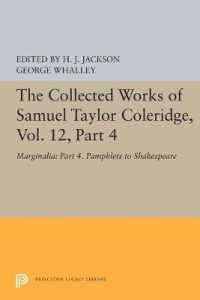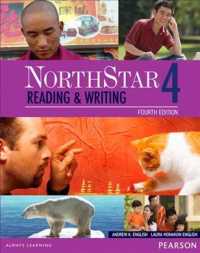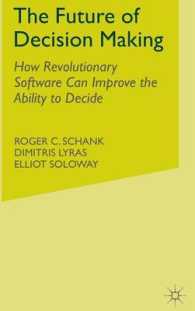- ホーム
- > 洋書
- > 英文書
- > Business / Economics
Full Description
Economics and fiction often pursue parallel objectives. Economists analyze human decisions and interactions in markets and other institutions. Fiction writers also provide keen insights into individual minds and motives, examining how their characters respond to conflict and tensions in varied situations. This book explores the insights to be gained from developing this parallel.
In each chapter, economists discuss classic or contemporary literary creations, exploring economic incentives that motivate the characters, the economic mechanisms that tie them together, and/or the economic context in which they live and develop. Exploring the synergy across economics and literature offers new understandings of themes, including capitalism and colonialism, marriage and markets, gender norms, inheritance and estates, and the political economy of poverty. The broad and deep range of literary works includes writers from Shakespeare and Goethe, through Chekov and Steinbeck, to recent Nobelists Abdulrazak Gurnah and Han Kang. By offering new understandings of both economics and literature, readers will gain deeper insights into people's thought processes, choices, and consequences.
This book will captivate readers in economics, social sciences, and the humanities and open their minds to the viewing of economic ideas and concepts through the prism of great works of literature.
Contents
Editors' Introduction Part I: Development and structural transformation of society and economy 1 A Bengali Novel on Economic Transition in History 2 Tradition and Modernity in Subsaharan Africa: Insights from Achebe's Things Fall Apart 3 The Art of Conquering Without Being Right: Agency, Education, and Learning by Doing in Cheikh Hamidou Kane's "Ambiguous Adventure". 4 On Capitalism and Colonialism: The Economic Imperatives Underlying Amitav Ghosh's "Sea of Poppies" 5 The Lone Scream in the Dark: Cultural Change and Institutional Transformation in Modern China as seen through Lu Xun's Novel 6 Zola's Ladies' Paradise and Creative Destruction 7 Women in a nervous breakdown: Intra household bargaining and gender norms in South Korea Part II: Market operation and dysfunction8 Only the Housing Problem Has Corrupted Them 9 Can Machines Replace Us? 10 Abdulrazak Gurnah and Contract-Enforcement Institutions in His Novel By the Sea 11 Marriage and Markets: Lessons from Pride and Prejudice Part III: Limits of the Homo Economicus model 12 The Esterházy Myth: How Economics and Literature Correct Mistakes 13 The Nostalgia for Missed Opportunities 14 The Financial Expert of Malgudi 15 Estates, Inheritance and Gifts: Looking a Gift Horse in the Mouth 16 The Inheritance Mess: Père Goriot and King Lear Offer Us a Mirror 17 The Master, the Helicopter, and Margarita 18 Money in the Faustian pact Part IV: Rent-seeking, corruption and bad political governance 19 How Steinbeck Speaks to Institutions in Economics 20 The Economics of Innocence: Imbolo Mbue's "How Beautiful We Were" 21 Frank Herbert's Dune








